In the Pullambadi village of southern India's Tamil Nadu state, a teacher stands before a group of children, pointing at a posterboard of the alphabet.
The students listen to the teacher attentively from their seats on the ground and raise their hands energetically when she asks a question.
The children are part of the Irular community, one of India’s oldest Indigenous communities that faces social discrimination and harassment from other castes in the country. For these children, this week-day learning from the dirt or tarp-covered floor of the cinderblock shed at their teacher’s own home is one of the most consistent opportunities for education that they have ever known, and their admiration for their teacher shows.
To them, she is a hero. She is their beacon of light in a setting that can seem too dark to navigate alone.
Her name is Nalini, and when she was a child herself, she dreamed of sharing her knowledge and love of learning with others. But she never imagined that being a teacher could help lead her entire community from darkness toward hope.
Seeking The Lighthouse
The woman who brought knowledge and hope to an Indigenous community in India
March 06, 2023 | Be Inspired
the nurse who dreamed of teaching
Nalini’s own access to education and career opportunities has been limited in her country where patriarchy is still prevalent.
Despite successes in education equality in India in recent decades, barely 70% of Indian women are literate compared to 84% of men. The gender literacy gap is more evident in rural India, where only 66% of women are literate compared to 81% of men. Education appears to be a key determinant of wage inequality in India, but as education has increased, women tend to withdraw from the labor force due to less availability of suitable jobs. India has one of the lowest female labor participation rates in the world, according to the World Bank.
This was the social landscape in which Nalini came of age, but she was determined to defy any constraints.
Nalini wanted nothing more than to be a teacher one day, but after high school, she sought a nursing career at the behest of her family. After marriage, she left nursing amidst pressure to care for her growing family full time. She and her husband, Birla, who is a day laborer, now have three children, including 14-year-old Unbound sponsored child Angel.
With the approval of her husband, Nalini later pursued a diploma in teacher training.
“That [teaching] was my passion right from childhood,” Nalini said. “I worked in a school for four years afterward. I feel so happy to teach others.”
When the COVID-19 pandemic sent the schools into shutdown in 2020, Nalini was not discouraged. Without hesitation, she volunteered to teach the children in her community, a community that had been disadvantaged for decades — the Irular community.
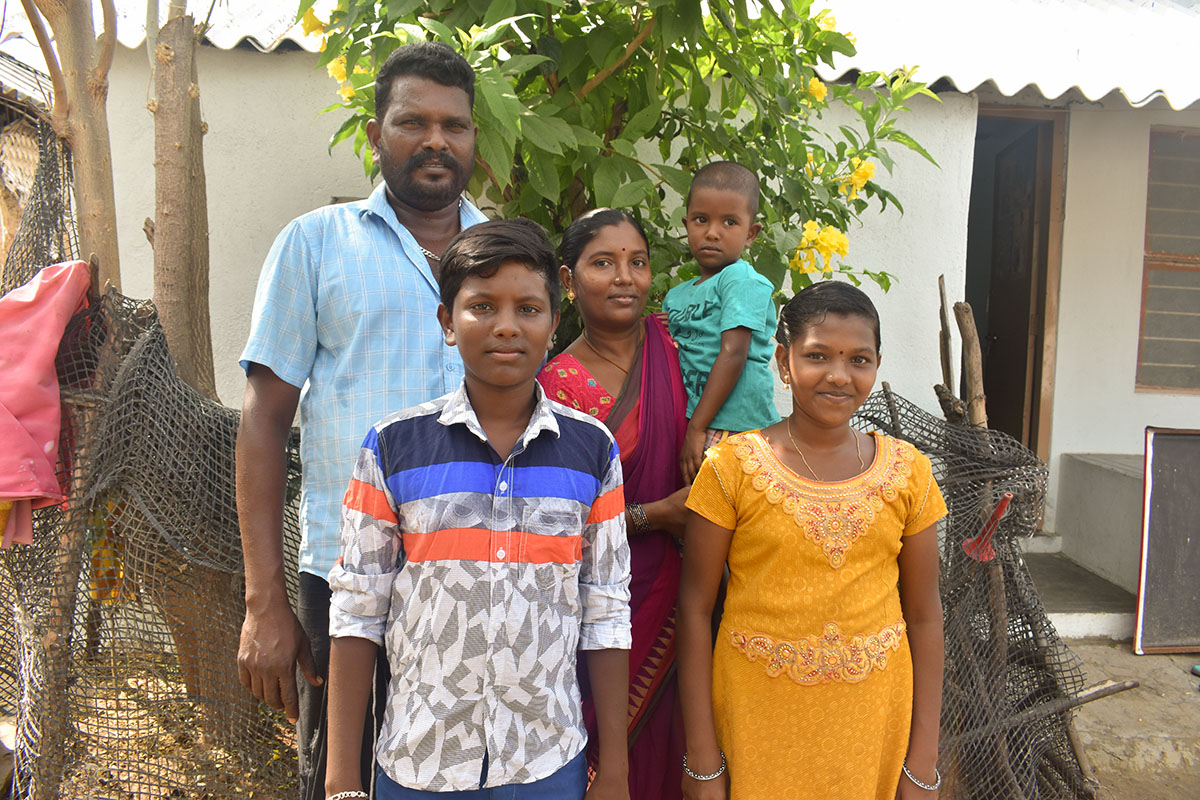
Learning has been such an important part of Nalini’s life that even now, at the age of 34, many of her old books from childhood are still her most prized possessions. With the approval of her husband, she returned to school to earn a diploma in teacher training after the birth of her children. Pictured in front of their home in Tamil Nadu, India, is Nalini (back row) with her husband, Birla, and their youngest son Aaron Raj, 6; (front row) their oldest son Santhosh, 17; and daughter and sponsored child Angel, 14.
the irular of tamil nadu
The Irular are one of the six primitive Indian tribal groups that inhabit the northern districts of Tamil Nadu. They are a "scheduled tribe," or an officially designated group of people that are among the most disadvantaged socioeconomic groups in India.
Irular means “people of darkness.” The original occupation of the Irular people was rat and snake catching, but with the abolishment of snake catching by the Indian government, Irular make their livings as day laborers by collecting honey, fishing, cutting wood and harvesting rice.
Irular communities have lived for more than 30 years without necessities like water, electricity, housing, land, documentation or education and, although government programs now exist to support the Irular communities, their unawareness of such assistance continues to inhibit their development and welfare.
According to Antony Bosco Jacob, correspondence and evaluation coordinator with Unbound Tamil Nadu and South Tamil Nadu programs, Irular people face severe discrimination and harassment, as they are looked down upon by other communities. It’s estimated that more than 60% of Irular people are illiterate.
“Irular people are not included or invited to [community events or festivals],” Jacob said. “[If they study], they mostly discontinue their studies; but they are slowly changing, and now desire for their children to have a good education.”
Nalini’s husband’s family, though not Irular themselves, have lived among the Irular community in Tamil Nadu for more than 30 years. Nalini and her family have been living among the Irular for 17 years now. With a deep-rooted concern for the well-being of the community that she had come to call home, Nalini found her calling as a teacher among the Irular.
education at their doorstep
When Nalini began voluntarily teaching the children during the pandemic, 14 children attended her classes, including Unbound sponsored children. After seeing the children’s progress, more Irular families sent their children to Nalini’s class, which is now 30 students strong.
In 2021, in an effort to get children back to the classroom following the pandemic, the government introduced a program called Illam Thedi Kalvi, or “Education at Doorstep.” Under this program, classrooms were extended outside schools, and teachers were selected to offer weekday evening classes to students in their own communities.
Following recommendations from school principals and the Unbound Tamil Nadu staff, Nalini was selected to teach in the Pullambadi village because she “knew the best ways to teach her community’s children.” Under the Education at Doorstep program, Nalini now receives a monthly salary and teaching resources from the government to teach Irular children, ages 6 to 10 years old. She holds her classes every evening for two hours in an open shed outside her own home.
In addition to this initiative, Nalini also continues to voluntarily teach children in the community who are 11 to 15 years old as well. For the comfort of her students, Nalini has spent her own money to make improvements to her outdoor classroom, adding lights and a fan. She gives special attention to slow learners in her classrooms because she understands what education means for their futures.
“I feel so joyful whenever the children show progress in their studies,” Nalini said. “I am overjoyed when the kids approach me and ask, 'What should I read today?'”
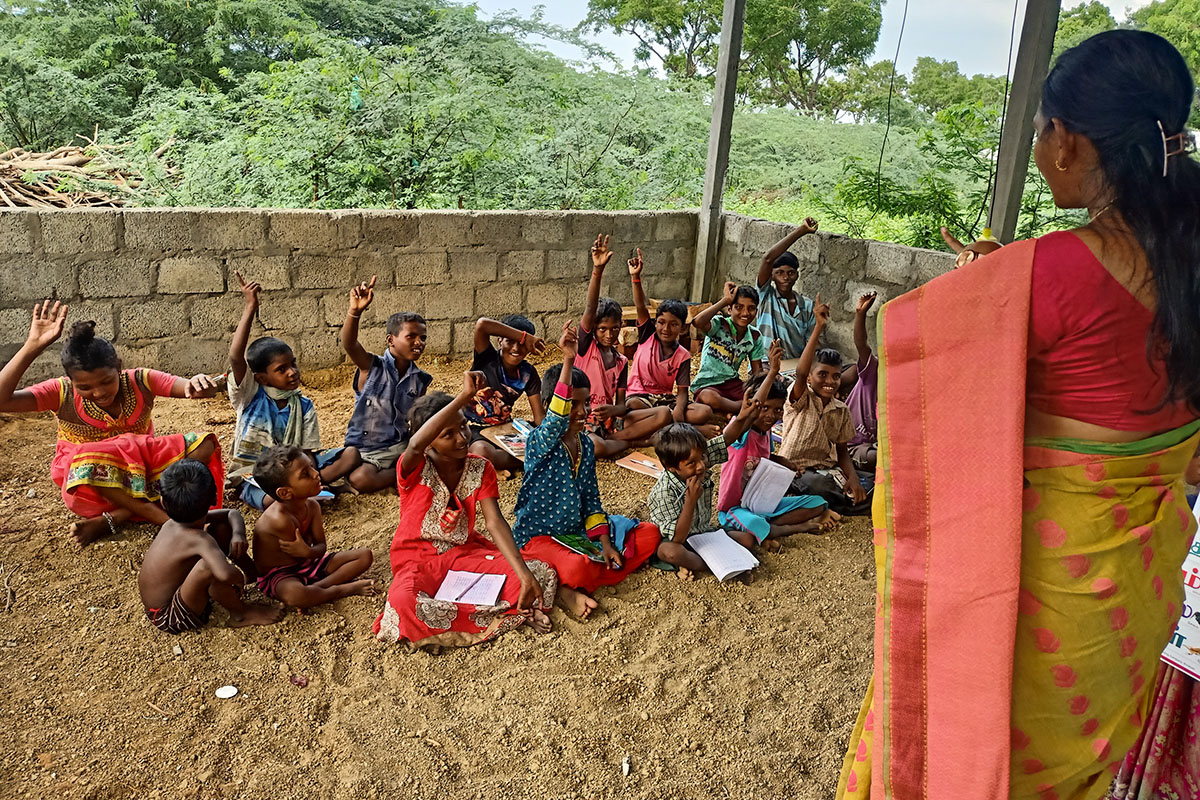
Situated on the dirt floor of their classroom at their teacher's home in the Irular community in Tamil Nadu, Irular children raise their hands eagerly to answer questions. Since hiring on as a teacher for the government initiative Illam Thedi Kalvi, or “Education at Doorstep,” Nalini’s weeknight classes in the Irular community have grown from 14 children to 30.
the light in the dark
In 2011, Unbound Tamil Nadu introduced the Sustainable Livelihood Program (SLP) to its mothers groups. According to Jacob, these micro-level training and entrepreneurship activities were meant to teach the mothers practical skills they could develop to start a business, which in turn, would help to generate extra income for their struggling families.
In just the past nine months alone, more than 970 mothers have been trained in SLP activities, including Nalini, whose family’s income benefited for a time from the basket-weaving skills she mastered. She credits her mothers group for teaching her independence, “allowing her to discover hidden strengths and talents,” and for assisting her in the development of her leadership abilities.
The solidarity she developed with the Irular mothers in her group is what eventually helped her get through to them about the importance of their children’s educations, which in turn, led to the increase in her classroom enrollment. In addition, Nalini teaches the mothers about government programs that could benefit them, how to write their signatures and helps them with important paperwork.
Her efforts to improve her community in the best way that she knows how have not gone unnoticed.
“Many women here are skilled and talented, but they never unveil those skills for the improvement of their community,” Jacob said. “Nalini has given importance to the development of her community and of uplifting the children with skills that she has. She is a perfect example that other women can follow.”
Her status amidst the Irular community and within her own family has changed as well. Among the Irular people, she holds much respect for the knowledge and good habits she is teaching the children. Young and old in the village greet her kindly and wish her well. Her husband and her in-laws are proud of her and what she is accomplishing in their community.
Nalini has been described as like a lighthouse, her ray of light emitting hope to the weary who are navigating a hazardous rock and reef-riddled coastline. She is the safe harbor for the futures of those who’ll come behind her.
“My dream,” she said, “is to [improve the lives] of my children and the children in the community, to help them get settled in their lives through good education, and to be responsible people to serve the community.”
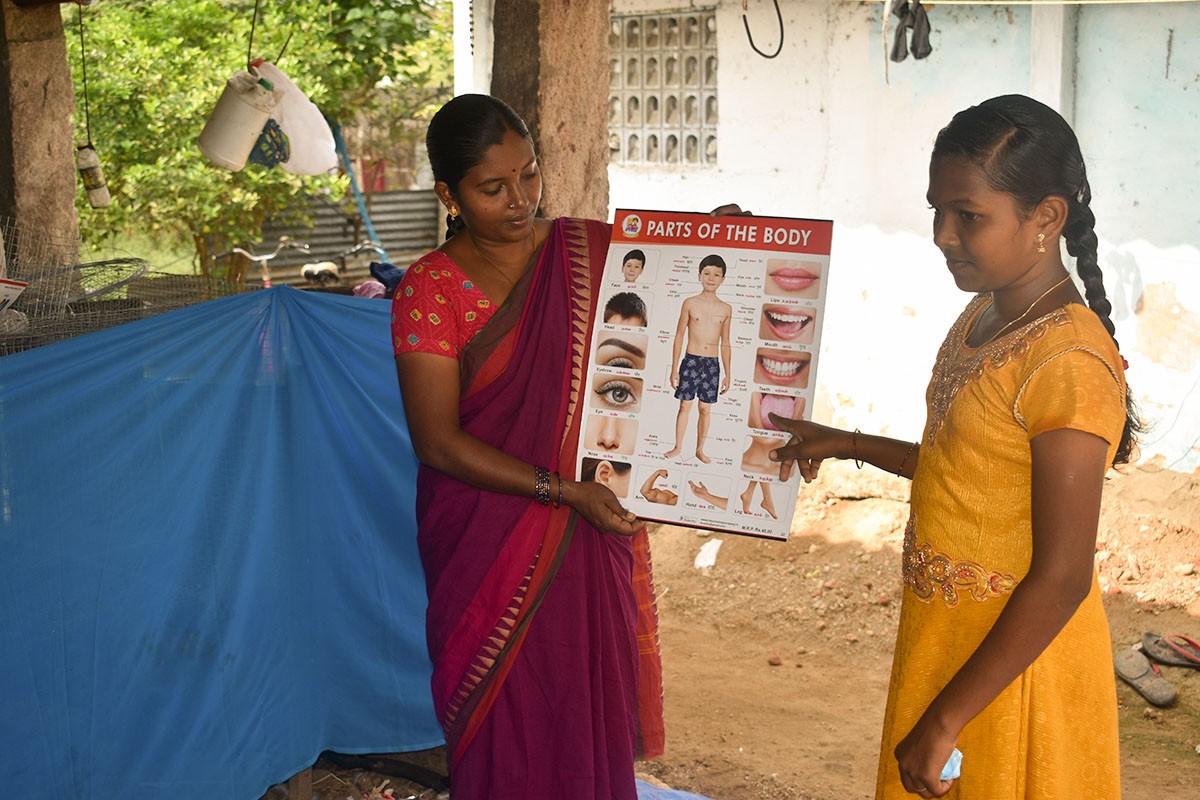
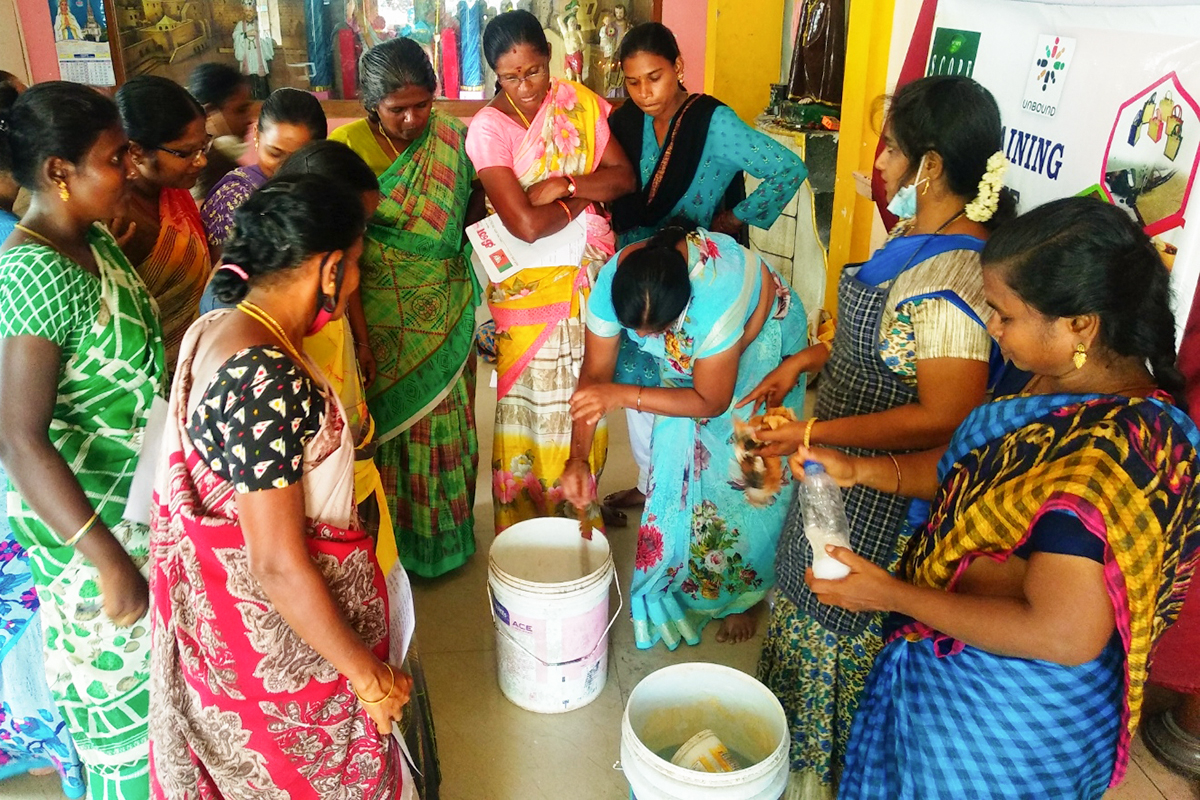
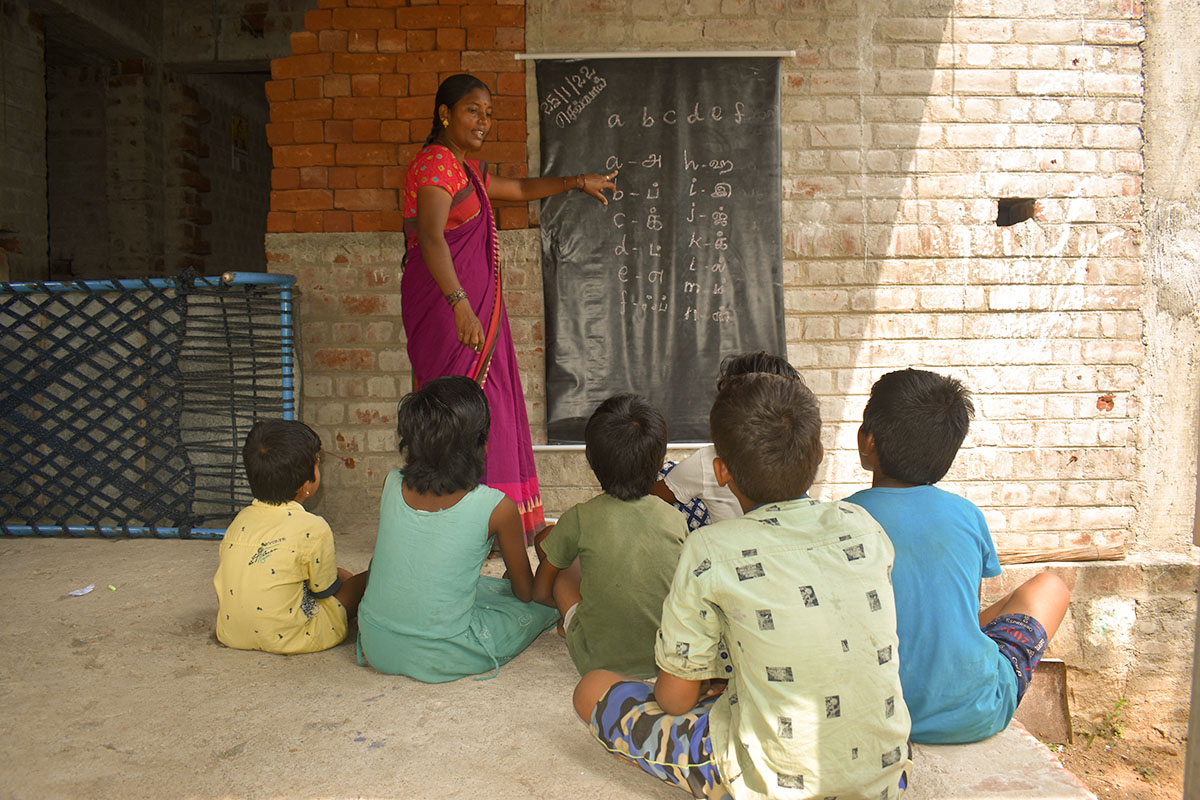
Photo 1: Nalini’s daughter and Unbound sponsored child, Angel, helps her mother list off the parts of the body to a class of children. At 14, Angel aspires to one day be a doctor.
Photo 2: As part of the Sustainable Livelihood Program (SLP) with Unbound Tamil Nadu, a mothers group gathers to learn how to mix chemicals to make homecare products. The SLP mothers group Nalini trained with learned basket weaving and incense making. All the mothers learn how to start a business that can be a source of sustainable income for them and their families.
Photo 3: Nalini’s dedication to teaching Irular children and improving the lives of all Irular people has earned her the respect of her community and family, and admiration from students of all ages.
I feel so joyful whenever the children show progress in their studies. I am overjoyed when the kids approach me and ask, 'What should I read today?'
— Nalini, Teacher and mother of sponsored child













